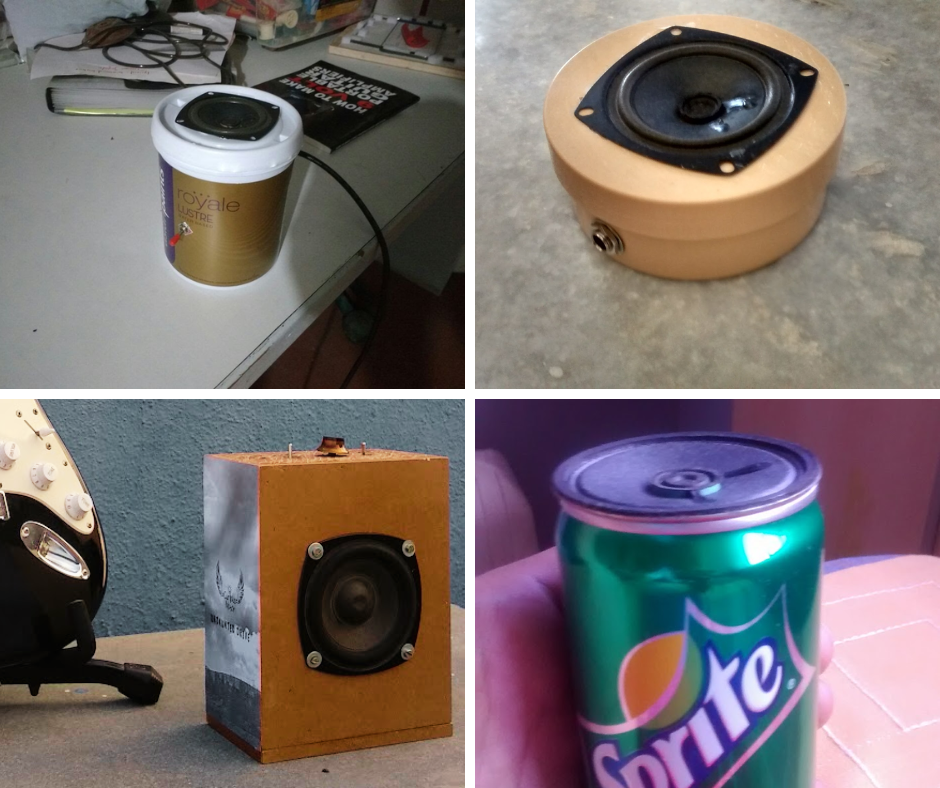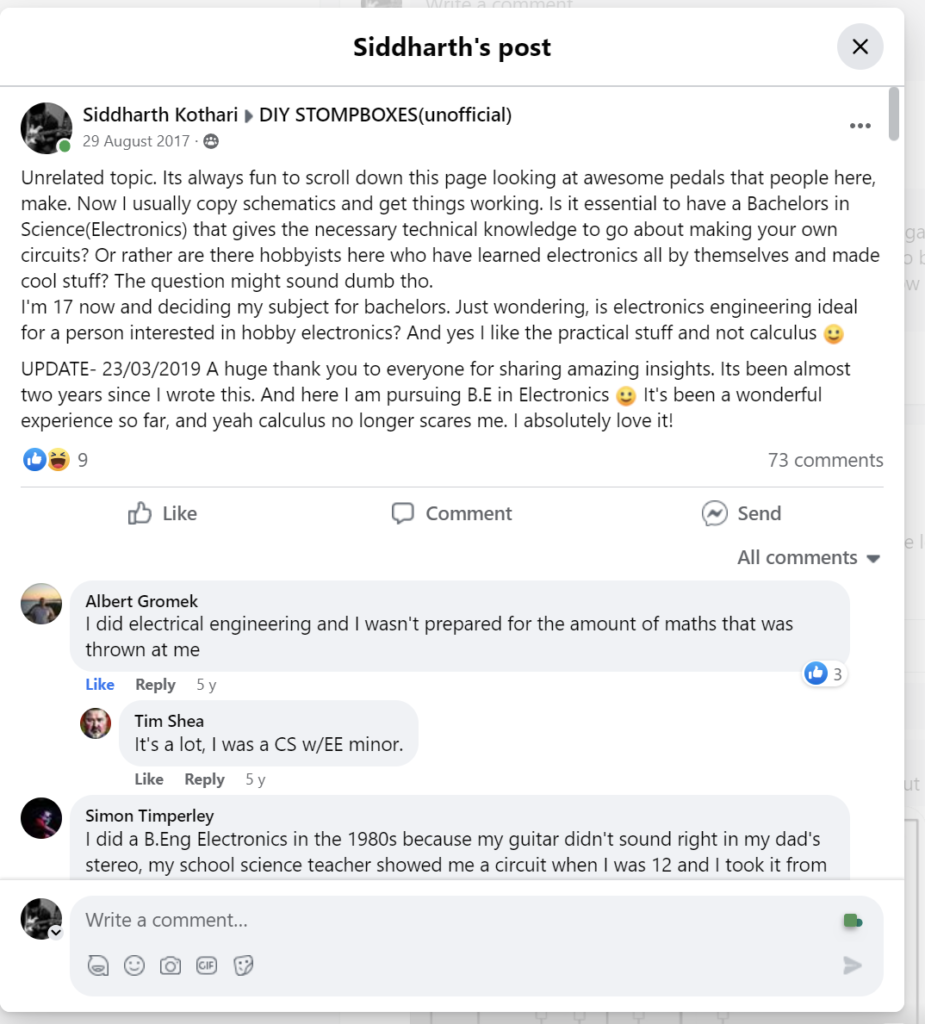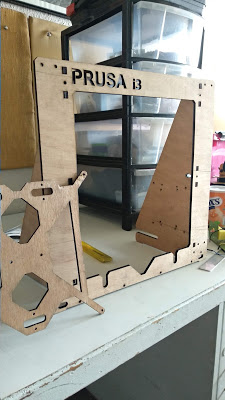
It all started when I bumped into a rather unique hobby of building guitar effect pedals. In 2015, I found myself in a 20k+ member community of guitar pedal enthusiasts on Facebook. Being a teenager who couldn’t make a head or tail of the conversations in the community, I was intrigued by how people could themselves make electronic circuits that squeezed, crushed, stretched and echoed sound.
I figured that if I could learn to read circuit diagrams and source the parts from somewhere I could make those cool sound-bending circuits at home. Armed with YouTube tutorials and the discovery of a local shop selling electronic components, I managed to assemble a “dark sensor” circuit. This ingenious little circuit would turn on an LED whenever an LDR (light sensor) would sense darkness.
After this little Eureka moment, I did the most important thing that the 15-year-old me could think of. I made a YouTube tutorial of what I just learned from YouTube (** face palm**) (oh great, it’s still there)
Within a year, my bedroom turned into a mini-lab filled with components that I salvaged from broken electronics. I would visit my fathers office to salvage electronics from old PCs and other discarded gadgets. Once in a while, someone would scream only to realize they’ve stepped on a resistor while in my room. With access to a soldering iron and all these salvaged components I started making guitar amplifiers out of every spacious drill-able box I could find at home.


The question everything phase.
However, it slowly started to dawn on me, that none of my circuits were original. Without the internet, I had no skills. Memorizing circuits and diagrams could get me only so far. Googling told me ‘Electronics Engineering (EE)’ is the subject that I needed to study, to quench my thirst for electronic-originality.
Luckily, being born in an Indian household, my hobby was literally aligned to one of the most conventional Indian career paths- ‘Engineering’. But does one need to study 4 years of ‘engineering’ just to be able design circuits and understand electronics? What about the math? 4 years of math? Do all the 20k+ members in the pedal community have a background in EE?
It was time to find out.

To my surprise, a very small fraction of people in the group actually had a formal degree in EE. I received a spectrum of answers from people who had no formal EE education with their Bachelors subject ranging all the way from social work to physiology and archaeology. It didn’t take a lot to infer that to be able to create original circuits one doesn’t need to have any formal EE training. However, I went ahead with pursuing an EE degree.
Fast Forward : one pandemic and one degree later.
Straight to the question: Did pursuing a formal education in electronics engineering enable me to design my own circuits independently of the internet?
Nope. But it enabled me to think in ways I could not have imagined earlier. I never really learnt how to be independent of the internet when it came to designing circuits. Instead, I learnt how to efficiently leverage the internet to design circuits faster.
What did I learn through my formal EE education?
1. Explore the depth only to appreciate the surface better
EE courses often dive into the depth of why and how things work at the electron level. The course teaches you to appreciate the research that led to modern technologies, and the origin of formulae that are now common knowledge. I know I’ll never have to see those formulae again unless there’s a zombie apocalypse and all traditional human knowledge has been wiped out.
2. Using math as a tool and not as means
Math is simply one of the languages spoken in the world of science. While conventional engineering education relies on heavy math usage, there are ways to tackle the same problem without using math (like trial and error). One good thing that came out of it was, I no longer fear dealing with complex math. Not that I have it all on my fingertips, but it did equip me with the confidence to deal numbers and equations under the sun.
3. Building up a new vocabulary for thinking
Immersing oneself in a subject for four years builds not only the ability to read, write, and speak its language, but also a new vocabulary for thinking. By being fully immersed in a subject, one can leverage the specific jargon and analogies associated with it to think and ideate more effectively. It’s akin to having a toolbox of concepts and ideas that can be readily accessed and employed.
4. Learning to work with standard documentation
Now this may be very EE specific, but was one my most valuable learnings. Before getting into engineering, I would salvage the rarest of components and use them to make small gadgets that would work. I could blog about and create an open source project. But how far would people be able to follow the project if the parts I use came from CFL bulbs, a broken old microwave and a printer?
While working with what’s available is an important skill, working with standard components and documentation practices allows one to exchange ideas with the world.
5. Appreciate collaboration and interdisciplinary learning
It is only in textbooks that electronic concepts in isolation make sense. Using theoretical knowledge in the real world is more convoluted than one would imagine. Electronics is always dealt with in a context, for instance it could be electronics in a cryptographic storage, self driving car, or something as bizarre as a geo-stationary satellite. To apply theoretical EE knowledge in any of these domains, you’d have to delve into the domain and start speaking their language before you can understand the problem. Talking about resistors and capacitors will not help you convey concerns with satellite design. The four years at college exposed me to various interdisciplinary fields where I got a glimpse of some problems that electronics can solve.
Final thoughts
I thoroughly enjoyed it. It may have felt a bit mathy and bookish with some courses but was totally worth it. Essentially, you learn to make your own toys + get access to well paying jobs, if that’s your thing. I landed a robotics job right after college and fell in love with the subject all over again. There are a lot of Indian education specific things that I’d rather not touch in this post, but overall, it was a very positive experience.
What’s your take on formal education? Let me know in the comments 🙂




Shalini Jain
May 28, 2023 at 11:40 amAlways intrigued by your profound thoughts when you talk about this fav topic of yours. On similar lines, I don’t really feel the need of a degree like B.Ed. when it comes to teaching. If teaching is your passion,u hv a command over subject n can express urself well, u don’t really need a degree. My thoughts😊
Siddharth
May 28, 2023 at 5:28 pmThank you! Totally agreed. A lot of factors come into play while developing a skill, thankfully formal education isn’t one of them 🙂